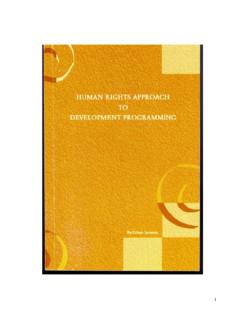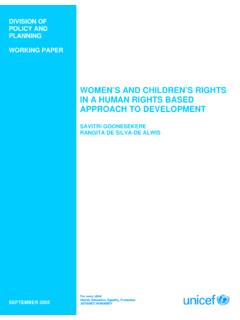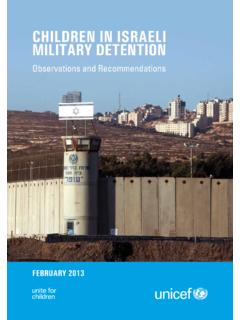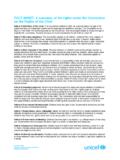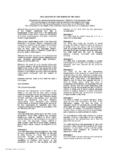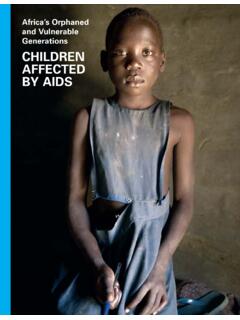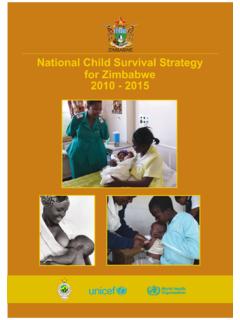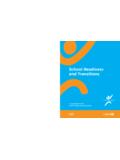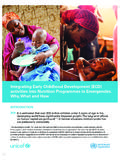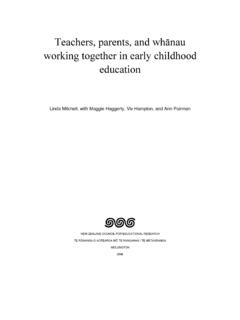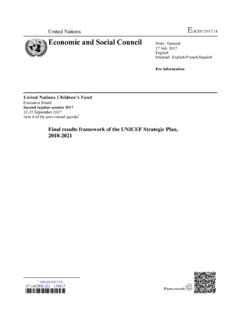Transcription of CHILD SUPPORT GRANT EVALUATION 2010 - UNICEF
1 CHILD SUPPORT GRANT EVALUATION2010 QUALITATIVE RESEARCH REPORTC hild SUPPORT GRANT EVALUATION 2010 : Qualitative Research ReportJune 2011 This study was commissioned and funded by the Department of Social development (DSD), the South African Social Security Agency (SASSA) and the United Nations Children s Fund ( UNICEF ) South Africa. It was managed by the Economic Policy Research Institute (EPRI), and implemented by the Institute of development Studies (IDS), the International Food Policy Research Institute (IFPRI), Reform development Consulting (RDC) and Take Note Trading (TNT). This qualitative research project is part of a multi-year integrated qualitative and quantitative impact assessment commissioned by the Department of Social development , the South African Social Security Agency and UNICEF South Study team: Stephen Devereux (Institute of development Studies [IDS]), Michelle Adato (International Food Policy Research Institute [IFPRI]), Rachel Sabates-Wheeler (Institute of development Studies [IDS]), Jesse McConnell (Reform development Consulting [RDC]), and Elisabeth Becker (International Food Policy Research Institute [IFPRI]).
2 The fieldwork team: Fiona Baloyi, Jerry Baloyi, Basithile Dlamini, Wendy Mabasa, Clifford Mabhena, Naledi Mazibuko, Wandile Nyandeni, Sydney Radebe, Phumlani Zulu, Ashling McCarthy, Amy Hixon and Soomaya Khan. Gratitude to the adult and CHILD respondents for their inputs and contributions. The valuable contribution of the following is also acknowledged: Eric Musekene, Rudzani Takalani and Alice Odhiambo from SASSA, Thilde Stevens, Thabani Buthelezi, Maureen Motepe, Tsholofelo Adelekan and Dibolelo Ababio from Department of Social development ; Lucia Knight and Linda Richter from HSRC; George Laryea-Adjei and Nkechi Obisie-Nmehielle from UNICEF ; and Patrick Chiroro from Impact Research International. Department of Social development / South African Social Security Agency/UNICEFAll care has been taken to ensure that the information is correct and original sources have been indicated for reference and verification. With an identification of the Department of Social development , South African Social Security Agency and UNICEF as source, the document may be freely quoted, reviewed, abstracted, reproduced and translated, in part or in whole, but not for sale nor for use in conjunction with commercial purposes.
3 Original sources should be acknowledged where indicated in the citation: Department of Social development , South African Social Security Agency and UNICEF . 2011. CHILD SUPPORT GRANT EVALUATION 2010 : Qualitative Research Report. Pretoria: UNICEF South AfricaObtainable free of charge from:Department of Social development , South African Social Security Agency and UNICEF Website: ; and photograph: AP Photo/Jerome DelayLayout: Handmade Communications SUPPORT GRANT EVALUATION 2010 QUALITATIVE RESEARCH REPORTACRONymSACASI Audio Computer Assisted Self interviewCSG CHILD SUPPORT GrantDoE Department of EducationDSD Department of Social development ECD Early Childhood development EPRI Economic Policy Research InstituteFGD Focus Group Discussions HS High SchoolIDS Institute of development Studies IFPRI International Food Policy Research InstituteILO International Labour OrganizationKII Key Informant Interviews KZN KwaZulu-NatalMIS Management Information SystemM&E Monitoring and EvaluationNAFCOC National African Federated Chamber of Commerce and IndustryPSU Primary Sampling Unit RDC Reform development ConsultingSASSA Social Security AgencySOCPEN Social Pension System SWS Social Welfare ServicesUNICEF United Nations Children s FundCONTENTSA cronyms.
4 DExecutive Summary ..1 Chapter 1 Introduction .. Overview of the CHILD SUPPORT GRANT The 2009/10 CSG EVALUATION Genesis of this study Study aims, objectives and purpose Project deliverables and activities Research topics and issues 11 Chapter 2 Methodology .. Research methods Focus group discussions Key informant interviews Sampling Provinces Localities Individuals Training Fieldwork Roles and responsibilities of the field teams Fieldwork schedule Data management and analysis Note to the reader 23 Chapter 3 GRANT access .. Eligibility criteria Extension of age threshold Documentation required Reasons for not applying Improvements in GRANT access Corruption and fraud Alleged corruption by officials Alleged fraud by claimants Suggestions for improvement Improved accessibility Shorter queues Higher payments Vouchers Conclusion 35 Chapter 4 Pay-point issues.
5 Diversity of collection points Advantages of alternative collection points Disadvantages of alternative collection points Conclusion 39 Chapter 5 Use of GRANT .. How CSG money is used Misuse of the CHILD SUPPORT GRANT Differences in the use of CSG money and other money Decision making regarding use of CSG within the household Access to CSG and GRANT -sharing within the household Conclusion 49 Chapter 6 Education .. Why children miss days of school economic causes Lack of money and material things Work instead of school Why children drop out of school economic causes Lack of money and material things Relationships with older men for money Working instead of going to school Why children miss days of school social causes Peer pressure and influence Drug or alcohol use Crime Relationships with girls/boys Laziness or lack of interest Problems and responsibilities at home Problems with teachers Why children drop out of school social causes Peer pressure and influence Drugs and alcohol Crime Relationships with girls/boys Pregnancy Laziness or lack of interest Care of family members Perceptions of the effects of the CSG on education What is needed to keep children in school Parental and teacher involvement Government involvement Social worker
6 SUPPORT The new conditionality policy Conclusion 67 Chapter 7 Health .. Birth certificates Access to health care Conclusion 71 Chapter 8 CHILD work and CHILD labour .. Children s economic activities Household chores Reasons why children work Children s work and education Conclusion 78 Chapter 9 Adolescent risk .. What are the main risks that adolescents face? The role of income poverty in adolescent risk Girls relationships with older men Sharing the CSG with children Other risk factors: Crime, substance abuse and the family environment Does the CSG reduce adolescent risk? Conclusion 90 Chapter 10 Social welfare .. Interactions with social workers Attitudes and accessibility of social workers The role of social workers Positive experiences with social workers Negative experiences with social workers Conclusion 95 Chapter 11 Early Childhood development Attitudes to ECD services Costs of ECD services Contribution of CSG to ECD Conclusion 99 Chapter 12 Conclusion.
7 Summary of findings GRANT access Pay-point issues Use of GRANT Education Health CHILD work and CHILD labour Adolescent risk Social welfare ECD services Recommendations Planning for the Phase 4 qualitative EVALUATION Timing Process of identification of key issues for Phase 4 study Proposed research methods for Phase 4 Lessons from the qualitative field report to inform future work 104 Annexure 1 Strategic Overview of the CSG EVALUATION ..105 Annexure 2 Research 3 NVivo Code List for CSG Qualitative Study ..137 BOxESBox 1 Attitudes of SASSA officials to computerisation 31 Box 2 Mothers who relinquish care of CHILD but not control and benefits of GRANT 43 Box 3 One woman s perceptions about of CSG money 44 Box 4 Inter-generational dynamics concerning use and control of GRANT 47 Box 5 Access to education: Transport problems in Limpopo province 53 Box 6 Income-earning activities by boys 73 Box 7 Income-earning activities by girls 73 Box 8 Illicit income-earning activities by boys and girls 74 Box 9 Dating older men for money in Meyerton: Poverty and peer influence 84 Box 10 The CSG as an alternative source of money.
8 Reducing the incentive for high-risk behaviour among adolescents in Shoshanguve 89 Box 11 Reasons why ECD services are valued by parents and carers 96 TABLEST able 1 CHILD SUPPORT GRANT beneficiaries by selected provinces, 30 September 2007 15 Table 2 Localities selected for qualitative fieldwork 15 Table 3 CSG qualitative study training workshop agenda 19 Table 4 Qualitative fieldwork time frame 21 Table 5 Tags for direct quotations by fieldwork respondents 23 Table 6 Prevalence of misperceptions of CSG eligibility criteria 25 Table 7 Reasons for applying late for CSG 29 Table 8 Disadvantages of alternative collection points 39 Table 9 Uses of CHILD SUPPORT GRANT 40 Table 10 School-related uses of the CHILD SUPPORT GRANT , by location 41 Table 11 Misuses of GRANT 42 Table 12 Sharing patterns of CHILD SUPPORT GRANT money 49 Table 13 Why children miss days of school 51 Table 14 Why children miss school 52 Table 15 Why children drop out of school 54 Table 16 Why children drop out of school (frequencies) 55 Table 17 How the CSG helps with schooling 63 Table 18 Main ways in which the CSG helps with schooling (frequencies)
9 64 Table 19 What is needed to keep children in school 65 Table 20 Adolescent risks 80 Table 21 Risks faced by adolescents 80 Table 22 Why girls date older men 81 Table 23 Driving factors of risky sexual behaviour 87 Table 24 How the CSG affects risky behaviour 87 Table 25 Relationship between CSG and risk 88 Table 26 SUPPORT provided by social workers 93 Table 27 Complaints about social workers 94 FIGUREF igure 1 Proportion of young South African women ages 15 19 years who dropped out of high school, by current sex partner age difference 821 Executive SummaryExECUTIVE SUmmARyThis summary introduces the preparatory qualitative study and explains the research methodology, summa-rises key findings by topic area, and then outlines the main CHILD SUPPORT GRANT (CSG) is a rare example in Africa of a comprehensive social GRANT programme for poor chil-dren, reaching million children as of June 2010 . In 2009 the Department of Social development (DSD), the Social Security Agency (SASSA) and UNICEF South Africa commissioned an EVALUATION of the CHILD SUPPORT GRANT , the first impact EVALUATION to date using a rigorous, quasi-experimental research design.
10 The EVALUATION follows a mixed-method approach, integrating quantitative and quali-tative research methods. The first phase of the work includes developing an EVALUATION strategy, conducting a qualitative assessment and undertaking a baseline survey for the quan-titative assessment. Later proposed phases of this EVALUATION will include a second qualitative study and an EVALUATION survey. This report presents the results of the first qualitative assessment undertaken in theory of change underpinning this EVALUATION is that access to the CHILD SUPPORT GRANT improves the well-being of recipients and beneficiaries through a number of key transmission mechanisms. These include the following propositions, which are tested in this EVALUATION :1. Cash grants targeted at children directly reduce the poverty and vulnerability of children living in poor In addition to funding increased consumption, cash grants enable poor households and carers to participate in productive economic activity ( to look for work).
